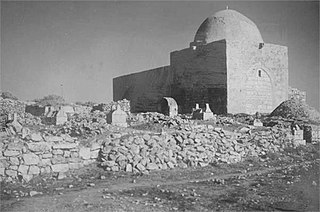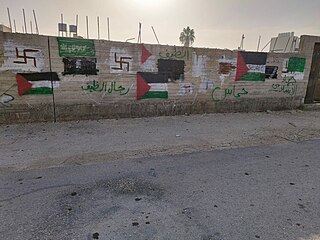
Bethlehem is a city in the Israeli-occupied West Bank of the State of Palestine, located about ten kilometres south of Jerusalem. It is the capital of the Bethlehem Governorate, and as of 2017 had a population of 28,591 people. The city's economy is largely tourist-driven; international tourism peaks around and during Christmas, when Christians embark on a pilgrimage to the Church of the Nativity, revered as the location of the Nativity of Jesus.

Palestinian Christians are a religious community of the Palestinian people consisting of those who identify as Christians, including those who are cultural Christians in addition to those who actively adhere to Christianity. They are a religious minority within the State of Palestine and within Israel, as well as within the Palestinian diaspora. Applying the broader definition, which groups together individuals with full or partial Palestinian Christian ancestry, the term was applied to an estimated 500,000 people globally in the year 2000. As most Palestinians are Arabs, the overwhelming majority of Palestinian Christians also identify as Arab Christians.

Palestine, officially the State of Palestine, is a country in the southern Levant region of West Asia recognized by 145 out of 193 UN member states. It encompasses the Israeli-occupied West Bank, including East Jerusalem, and the Gaza Strip, collectively known as the Occupied Palestinian territories, within the broader geographic and historical Palestine region. The country shares most of its borders with Israel, and it borders Jordan to the east and Egypt to the southwest. It has a total land area of 6,020 square kilometres (2,320 sq mi) while its population exceeds five million people. Its proclaimed capital is Jerusalem, while Ramallah serves as its administrative center. Gaza City was its largest city until 2023.

Rachel's Tomb is a site revered as the burial place of the Biblical matriarch Rachel. The site is also referred to as the Bilal bin Rabah mosque. The tomb is held in esteem by Jews, Christians, and Muslims. The tomb, located at the northern entrance to the Palestinian city of Bethlehem, next to the Rachel's Tomb checkpoint, is built in the style of a traditional maqam, Arabic for shrine.

Beit Sahour or Beit Sahur is a Palestinian town east of Bethlehem, in the Bethlehem Governorate of the State of Palestine. The city is under the administration of the Palestinian National Authority. The population was of 13,281 in 2017, consisting of approximately 80% Christians and 20% Muslims.
Religion in Israel is manifested primarily in Judaism, the ethnic religion of the Jewish people. The State of Israel declares itself as a "Jewish and democratic state" and is the only country in the world with a Jewish-majority population. Other faiths in the country include Islam, Christianity and the religion of the Druze people. Religion plays a central role in national and civil life, and almost all Israeli citizens are automatically registered as members of the state's 14 official religious communities, which exercise control over several matters of personal status, especially marriage. These recognized communities are Orthodox Judaism, Islam, the Druze faith, the Catholic Church, Greek Orthodox Church, Syriac Orthodox Church, Armenian Apostolic Church, Anglicanism, and the Baháʼí Faith.

The state of human rights in the West Bank and Gaza Strip is determined by Palestinian as well as Israeli policies, which affect Palestinians in the occupied Palestinian territories both directly and indirectly, through their influence over the Palestinian Authority (PA). Based on The Economist Democracy Index this state is classified as an authoritarian regime.

Sunni Islam is a major religion in Palestine, being the religion of the majority of the Palestinian population. Muslims comprise 85% of the population of the West Bank, when including Israeli settlers, and 99% of the population of the Gaza Strip. The largest denomination among Palestinian Muslims are Sunnis, comprising 85% of the total Muslim population.
Sheikh Taissir Bayood al-Tamimi (Arabic: شيخ تيسير التميمي is the chief Islamic judge of the Palestinian National Authority.

Christianity is the third largest religion in Israel, after Judaism and Islam. At the end of 2022, Christians made up 1.9% of the Israeli population, numbering approximately 185,000. 75.8% of the Christians in Israel are Arab Christians. Christians make up 6.9% of the Arab-Israelis.

The following outline is provided as an overview of and topical guide to the State of Palestine:

Diplomatic relations between the Holy See and the State of Israel, as well as a concordat defining the status and fiscal and property rights of the Catholic Church and related entities within Israel. Formal diplomatic relations between the two states were established after the adoption of the Fundamental Agreement by the two States on 30 December 1993. A Vatican Nunciature in Israel and an Israeli embassy in Rome were simultaneously opened on 19 January 1994. From the Vatican's point of view, the establishment of diplomatic relations between the two states is part of the Christian–Jewish reconciliation; and from the Israeli point of view, the normalization of diplomatic relations. Prior to the establishment of diplomatic relations, the interests of the Catholic Church in Israel were looked after by the Apostolic Delegate to Jerusalem and Palestine, the Latin Patriarch of Jerusalem and the Custodian of the Holy Land, all of which continue to function.

The Jerusalem Waqf and Al-Aqsa Mosque Affairs Department, also known as the Jerusalem Waqf, the Jordanian Waqf or simply the Waqf, is the Jordanian-appointed organization responsible for controlling and managing the current Islamic edifices on the Al-Aqsa mosque compound in the Old City of Jerusalem, known to Jews as the Temple Mount, which includes the Dome of the Rock. The Jerusalem Waqf is guided by a council composed of 18 members and headed by a director, all appointed by Jordan. The current director of the Waqf, since 2005, is Sheikh Azzam al-Khatib.

Tourism in the Palestinian territories is tourism in East Jerusalem, the West Bank, and the Gaza Strip. In 2010, 4.6 million people visited the Palestinian territories, compared to 2.6 million in 2009. Of that number, 2.2 million were foreign tourists while 2.7 million were domestic. In the last quarter of 2012 over 150,000 guests stayed in West Bank hotels; 40% were European and 9% were from the United States and Canada. Major travel guides write that "the West Bank is not the easiest place in which to travel but the effort is richly rewarded."

Racism in the Palestinian territories encompasses all forms and manifestations of racism experienced in the Palestinian Territories, of the West Bank, Gaza, and East Jerusalem, irrespective of the religion, colour, creed, or ethnic origin of the perpetrator and victim, or their citizenship, residency, or visitor status. It may refer to Jewish settler attitudes regarding Palestinians as well as Palestinian attitudes to Jews and the settlement enterprise undertaken in their name.

The Status Quo is an understanding among religious communities with respect to nine shared religious sites in Jerusalem and Bethlehem. Other holy places in Israel and Palestine were not deemed subject to the Status Quo, because the authorities of one religion or community within a religion are in recognized or effective possession of them.

At present, the Government of Israel controls access to the Temple Mount, also known as Al-Aqsa Mosque compound, in East Jerusalem's Old City, which is a holy place for Muslims, Jews, and Christians and an Islamic religious endowment under the management of the Jordan-based Jerusalem Islamic Waqf. There are entry limits to the Temple Mount for political and security reasons. In addition, Jewish religious law imposes restrictions on religious Jews on entering the compound.
Christian political theology in the Middle East is a religious response by Christian leaders and scholars to political problems. Political theologians try to balance the demands of a tumultuous region with the delicate but long history of Christianity in the Middle East. This has yielded a diversity of political theology disproportionate to the small size of Middle Eastern Christian minorities. The region's importance to Christians worldwide – both for history and doctrinal authority for many denominations – also shapes the political theologies of the Middle East.

Hashemite custodianship refers to the Jordanian royal family's role in tending Muslim and Christian holy sites in the city of Jerusalem. The legacy traces back to 1924 when the Supreme Muslim Council, the highest Muslim body in charge of Muslim community affairs in Mandatory Palestine, chose Hussein bin Ali as custodian of Al-Aqsa. The custodianship became a Hashemite legacy administered by consecutive Jordanian kings.
The status of religious freedom in Asia varies from country to country. States can differ based on whether or not they guarantee equal treatment under law for followers of different religions, whether they establish a state religion, the extent to which religious organizations operating within the country are policed, and the extent to which religious law is used as a basis for the country's legal code.












